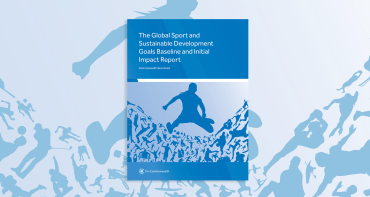The integration of AI into the sports sector has influenced everything from decision-making processes among coaches and athletes to enhancing fan engagement.
By Dr Radika Kumar, Adviser, Artificial Intelligence and Transformative Technology

In recent years, artificial intelligence (AI), including generative AI, has become a pivotal force in shaping socio-economic development across various sectors globally. Its impact is undeniable, with projections suggesting an annual growth rate of 19%, potentially reaching $900 billion by 2026.
One sector witnessing profound disruption is the sports industry, which is a significant contributor to the economies of many countries, including those within the Commonwealth. With the use of AI solutions in the sports market estimated to grow from USD 1.85 billion in 2023 to USD 6.59 billion in 2028, the implications for the sports industry are substantial.
The power of AI to transform the industry has inspired the focus of the 8th Commonwealth Debate on Sport and Sustainable Development on Tuesday, 26 March 2024.
This year’s debate will focus on whether artificial intelligence can be used to harness the power of sport to accelerate progress towards the SDGs. AI is already changing the game - from more detailed performance analytics to how immersive games can be.
AI’s transformation of the sports value chain
The integration of AI into the sports sector has influenced everything from decision-making processes among coaches and athletes to enhancing fan engagement.
Performance analytics, for example, allow for the meticulous analysis of player movements, tactics, and biometrics, optimising training, game strategy, and overall performance. This evolution has given rise to a market hungry for data-driven solutions, offering personalised coaching and performance tracking.
AI's role in fan engagement cannot be overstated. Partnerships, like that between Microsoft and the National Basketball Association or Oracle and Red Bull Racing, exemplify the innovative applications of AI in providing personalised experiences that connect fans with their favourite sports.
The technology provides invaluable insights into audience behaviours through sophisticated data analytics, enabling the sports industry to tailor experiences, improve content performance, and foster deeper connections with fans.

The concept of smart stadiums emerges as a futuristic vision, leveraging AI to create connected, efficient, and safe environments for spectators. This involves everything from crowd sentiment analysis for security purposes to providing personalised content directly to fans' mobile devices.
Additionally, the advent of AI-driven virtual and augmented reality technologies promises to revolutionise sports broadcasting by offering immersive experiences that will virtually transport fans into the heart of the action.
Navigating the challenges of AI integration
Despite these positive disruptions, integrating AI into sports presents significant challenges concerning ethics and regulation. Without appropriate oversight, the sports industry risks encountering issues related to unethical practices, unfair competition, and adverse impacts on athletes and other stakeholders.
Key considerations for the integration of AI in sports include:
- Data Privacy: Ensuring the transparent and consensual use of data is paramount. The sports industry must implement robust data protection measures to protect the information gathered.
- Development and Deployment of AI Models: AI models must adhere to principles of fairness, transparency, and accountability, avoiding discriminatory outcomes in player evaluation, recruitment, and game strategy.
- Algorithm Bias: It's crucial to develop AI models with diverse datasets that minimise socio-economic, racial, and gender biases.
- AI Divide: Unequal access to AI technologies could exacerbate disparities within the sports industry. Bridging the digital skills gap and providing AI infrastructure, including safety and security considerations, are essential to prevent further divisions.
The Commonwealth Secretariat's role in harnessing AI's potential
Recognising the dual nature of AI's impact, the Commonwealth Secretariat has established the Commonwealth Artificial Intelligence Consortium (CAIC). This initiative leverages member governments, industry leaders, think tanks and universities to bolster capacity throughout the Commonwealth in research, innovation, capacity building, data and infrastructure, and policy.
Through CAIC, the Commonwealth aims to explore potential research areas within the AI and sports nexus, addressing stakeholder interests and challenges. By embracing both the opportunities and challenges presented by AI, Commonwealth countries can help to foster an equitable, innovative, and ethical sports industry for the future.
While the benefits are vast, the way forward requires careful navigation of ethical and regulatory landscapes. The Commonwealth Secretariat, through the CAIC, is committed to exploring the possibilities of AI, assisting with educating citizens and addressing these regulatory challenges.
Register for the 8th Commonwealth Debate on Sport and Sustainable Development



